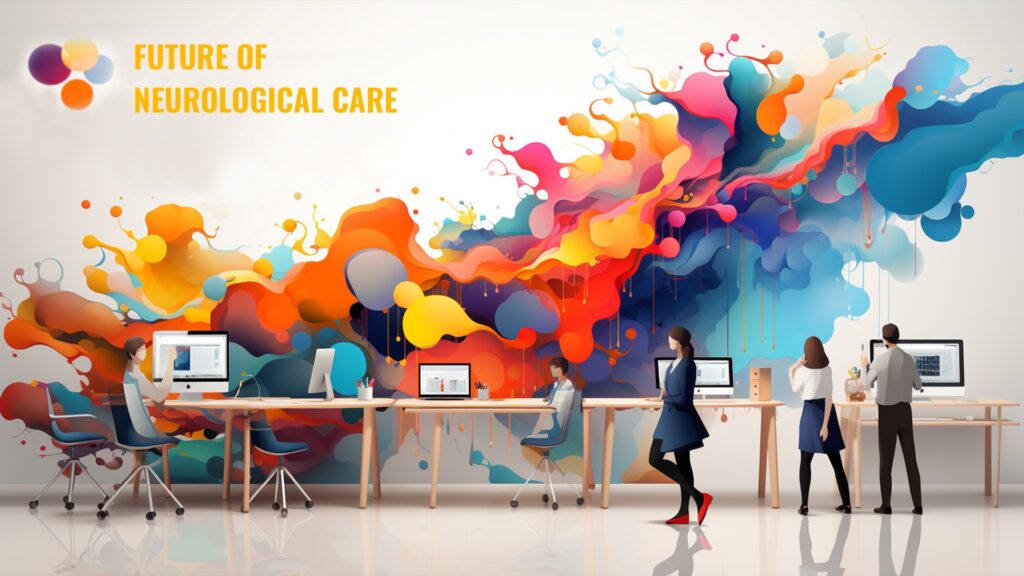
Introduction
Neurological care, encompassing the diagnosis, treatment, and management of disorders affecting the brain, spinal cord, and nerves, stands at a pivotal juncture. With rapid advancements in technology and a deeper understanding of neurological disorders, the future of neurological care is poised for transformative changes. This article delves into the predictions and emerging trends to reshape neurological care, highlighting how these developments will impact patients and healthcare providers.
Technological Advancements in Neurological Care
Neurological care is witnessing significant technological innovations that promise to enhance diagnosis, treatment, and patient management.
The Role of AI and Machine Learning
Artificial Intelligence (AI) and Machine Learning (ML) revolutionize neurological care. These technologies are being employed to analyze complex neurological data, predict disease progression, and even assist in diagnosing conditions like Alzheimer’s disease, Parkinson’s disease, and epilepsy. AI algorithms can process vast amounts of data from imaging, genetic testing, and electronic health records, offering previously unattainable insights.
Advances in Neuroimaging Techniques
Neuroimaging has always been a cornerstone of neurological care. Recent advances in this field, such as high-resolution magnetic resonance imaging (MRI) and positron emission tomography (PET) scans, provide unprecedented views of the brain and nervous system. These advancements are not just improving diagnostic accuracy but also aiding in understanding the pathophysiology of various neurological conditions.
Wearable Technology and Remote Monitoring
Wearable technology and remote monitoring devices are increasingly important in managing neurological disorders. Devices like smartwatches and sensors can track movement, monitor seizures, and even predict the onset of migraines. This technology enables continuous monitoring of patients in real-time, offering a more dynamic approach to treatment and care.
The Evolution of Treatment Approaches
As we venture into the future, treatment approaches in neurology are evolving, influenced by discoveries and patient-centered care models.Personalized Medicine in Neurology

Personalized medicine, tailoring medical treatment to individual patient characteristics, is becoming increasingly relevant in neurology. Advancements in genomics and biomarkers enable doctors to devise treatment plans based on a patient’s genetic makeup, improving the efficacy and reducing the side effects of treatments.
Gene Therapy and Neuroregeneration
The field of gene therapy and neuroregeneration holds immense promise for neurological care. By targeting the underlying genetic causes of neurological disorders, gene therapy offers the potential for treating and curing certain conditions. Neuroregeneration research, aimed at repairing, regrowing, or replacing damaged nerve cells, could revolutionize the treatment of conditions like spinal cord injuries and stroke.
The Integration of Holistic Approaches in Treatment
Holistic approaches, considering the physical, emotional, and social factors impacting a patient’s health, are gaining traction in neurological care. This includes integrating cognitive-behavioral therapy, rehabilitation, and lifestyle modifications alongside conventional medical treatments.
The Impact of Research and Clinical Trials
Research and clinical trials are the bedrock of advancements in neurological care, driving innovation and the development of new treatments.
Breakthroughs in Neurological Research
Recent breakthroughs in neurological research, particularly in neuroplasticity and neuroinflammation, provide new insights into how neurological disorders develop and progress. These discoveries are crucial in developing targeted therapies that address the root causes of these conditions.
The Future of Clinical Trials in Neurology
Clinical trials in neurology are evolving, with a greater focus on patient-centric designs and the use of real-world data. Advances in technology enable more efficient trial designs, and AI streamlines data analysis, making trials more effective and less time-consuming.
The Role of Big Data in Advancing Neurological Research
Big data is playing an increasingly important role in neurological research. The analysis of large datasets, encompassing genetic, environmental, and lifestyle factors, offers new insights into the complex interplay of variables contributing to neurological disorders. This data-driven approach is crucial in identifying new treatment targets and improving patient outcomes.
Using big data in neurological research is not just about handling large amounts of information but about deriving meaningful insights to drive personalized care and treatment strategies. By harnessing the power of big data, researchers can uncover patterns and correlations that were previously obscured, leading to breakthroughs in understanding and treating neurological disorders.
Patient Care and Management
Advancements in technology and treatment are reshaping the landscape of patient care and management in neurology.
Improvements in Patient-Centered Care
The shift towards patient-centered care in neurology is marked by an emphasis on treating patients as active participants in their care. This approach focuses on understanding patients’ unique experiences, preferences, and values. It leads to more engaged patients and care plans that align more closely with their needs and lifestyles, ultimately resulting in better health outcomes.
The Role of Telemedicine and Digital Health
Telemedicine and digital health platforms are becoming increasingly integral to neurological care. They offer convenience and accessibility, particularly for patients in remote or underserved areas. Through telemedicine, patients can receive consultations, follow-up care, and even specific therapies without physical travel, making continuous care more feasible and less disruptive.
The Importance of Multidisciplinary Teams
The complexity of neurological disorders often requires a multidisciplinary approach to care. This involves a team of healthcare professionals working together to provide comprehensive care, including neurologists, nurses, therapists, nutritionists, and mental health experts. Such teams ensure that all aspects of a patient’s health are addressed, from the medical to the psychosocial.
The Future of Neurological Care
Looking ahead, the field of neurological care is poised for significant advancements and changes.
Predictions and Emerging Trends
Future trends in neurological care include:
- The expansion of personalized medicine.
- Further integration of AI and machine learning into diagnostics and treatment planning.
- Greater use of gene therapy and neurodegenerative techniques.
Additionally, there is a growing recognition of the importance of lifestyle factors, such as diet and exercise, in managing and preventing neurological disorders.
Potential New Therapies and Diagnostic Tools
Developing new therapies and diagnostic tools is a crucial area of focus for the future. These may include novel pharmacological treatments, advanced neuroimaging techniques, and new biomarkers for early detection and monitoring of neurological diseases.
The Role of Global Collaboration in Neurology
Global collaboration is becoming increasingly important in advancing neurological care. Shared research, data, and resources across borders can accelerate the pace of discovery and lead to more effective treatments. Collaborative international clinical trials and research projects will likely become more commonplace, benefiting patients worldwide.
The Importance of Ongoing Innovation and Adaptation
Ongoing innovation and adaptation are essential in the rapidly evolving field of neurology. The area must continue to grow as new challenges emerge, whether from novel diseases or changing demographics. This requires technological innovation and a willingness to embrace new treatment paradigms and care models.
Conclusion
The future of neurological care is bright and filled with potential and promise. As we witness remarkable advancements in technology, research, and treatment approaches, the prospects for patients with neurological disorders are more hopeful than ever. The continued focus on patient-centered care, along with the integration of multidisciplinary teams and cutting-edge research, will undoubtedly lead to significant improvements in the quality of life for these patients.
The journey forward in neurological care involves discovery, innovation, and collaboration. By embracing these principles, the field can continue to make strides in understanding, treating, and ultimately preventing neurological disorders, offering a brighter future for those affected by these complex conditions.